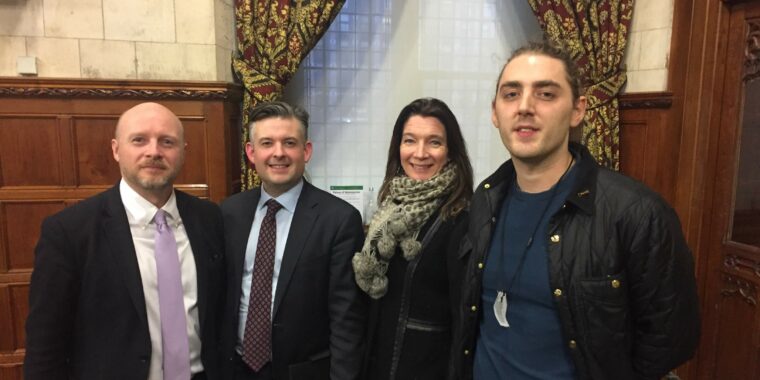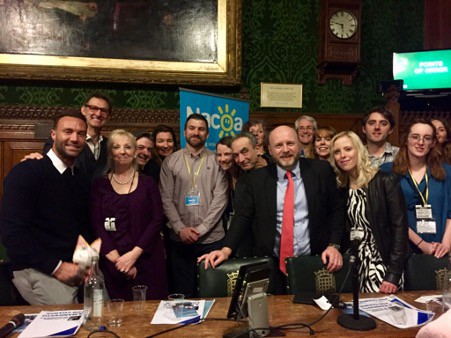
In February 2022, the government confirmed the total abolishment of its briefly-lived strategy for children of alcohol-dependent parents. A decision made despite children being caught in the national grip of spiralling alcohol deaths and casting a blind eye to 10% year-on-year increase in call numbers to Nacoa, the national charity for children of alcohol-dependent parents, for whom I am the Director of Communications.
It brought to an abrupt end a brief moment of clarity from government on this issue that affects some of the most vulnerable children in the United Kingdom. One in five children in the UK are thought to live with a hazardous drinker and the best numbers show that around 705,000 are thought to live with an alcohol-dependent parent.
Children, young people and adults growing up in these households face a farrago of adverse consequences, from mental health issues, poor performance at school, disordered eating, getting in trouble with police, and developing their own addictive behaviours.
Many witness domestic violence, experience abuse, or are forced into taking on caring roles for their parents and siblings. And half of these children keep it totally secret from the outside world.
Without early intervention like that which Nacoa provides, these children are much more likely to present later on in other areas of welfare, justice, or NHS waiting lists. Any ‘savings’ made by cutting support for such children is a totally false economy.
The roles were switched – instead of me being cared for, I was the carer.
Catherine, ‘Living with an alcoholic father’
The first ever national strategy to support children affected by a parent’s drinking
Inspired by Nacoa, in 2015 The Right Hon. Liam Byrne MP founded the All Party Parliamentary Group on Children of Alcoholics. He wrote how after ‘wrestling’ with the shame of speaking out that he ‘was knocked backwards by the avalanche of messages I got’ from parliamentarians.
We led a breakthrough campaign that lead in 2017 Jeremy Hunt (then the Health Secretary) to announce that he would fund helpline work for children affected. This was followed shortly after by a promise of a £6M initial strategy incorporating local, national, and helpline services.
At a landmark debate on alcohol harm in the House of Commons, then Shadow Health Minister Jonathan Ashworth MP shared his personal experiences of how this family secret had been the ‘biggest regret in [my] life’.
His opposing minister Nicola Blackwood MP broke into tears and pledged to address this social injustice.
Great social change requires three things. It requires long-term political will. It requires non-partisan partnership and it requires bravery. And I’ve heard all three of those today.
Baroness Nicola Blackwood
Prime Minster Theresa May spoke in PMQs about how she thought it ‘is unacceptable that children bear the brunt of their parent’s condition. It is important—and the government is committed—to working with MPs and right professionals…to get people the support that they need’.
On the launch of the first UK strategy for these children, Jeremy Hunt urged that ‘[It is] devastating for those in the grip of an addiction, but for too long the children of alcoholic parents have been the silent victims. This is not right, nor fair. These measures will ensure thousands of children affected by their parent’s alcohol dependency have access to the support they need and deserve.’
The aim of the strategy was to provide:
- fast access to support and mental health services for children and their families where there is a dependent drinker
- quicker identification of at-risk children, including those undertaking inappropriate care responsibilities
- the provision of outreach programmes to get more parents successfully through addiction treatment
- early intervention programmes to reduce the numbers of children needing to go into care
Over three years, Nacoa received funding to expand helpline services; £4.5M went into nine local authority ‘pilots’ who were encouraged to come up ‘with innovative solutions based on local need’; £1M was pledged to fund national capacity building by non-governmental organisations.
By finally supporting the few dedicated national children and families services in this sector, such as AdFam and Nacoa, these ambitious and novel aims from government were starting to be answered. By simply providing a targeted programme that made use of existing specialist expertise and experience, we saw emphases begin to change towards children within wider addiction treatment services, too.
The UK quickly became a world-leader in addressing this problem. I found myself in meetings with organisations from all over the world asking how we had pulled this off and what could be learned from this approach across Europe, Asia and the USA.
Thank goodness that Nacoa was there to answer all those calls throughout Covid. Awareness of accessible, non-judgemental services should be at the heart of all our agendas.
Camilla Tominey, Associate Editor of The Telegraph

Three years later, a strategy in tatters
The strategy was initiated with contracts for three years, with informal promises to Nacoa and others from Department of Health and Social Care and OHID (then PHE) that the plans would continue to be developed into the future.
However, 2021 arrived—Covid had hit—and government allowed the strategy to lapse, thus cutting nine new local projects (though some did get brief underspend extensions), all NGO activities, and cutting Nacoa’s helpline funding overnight.
Nacoa was left with an expanded budget and a huge increase in calls with no exit strategy or support by government, who had been implying the existence of onward planning up until the last minute. This at a time when calls were at record highs from a growing number of people in dire distress:
Coronavirus led to me being at home more and my mum’s drinking is worse than ever. I am so isolated and she is very violent, I don’t know where to turn to.
Jack, Helpline caller
The Dame Carole Black Report arrived in the Summer of 2021, which led to £267M funding being restored to the addiction treatment sector, but made no provision for dedicated services for the children of alcohol-dependent parents.
The most vulnerable of these children, those whose parents are not in touch with recovery services (approximately 4 in 5), are abandoned, in national policy terms. Ditching the strategy was an active choice to turn away from the children who were most in need. That is, unless the child is in the vanishingly rare situation where an outlying local authority service has managed to survive, which tend to offer time-limited interventions that require parental consent.
Despite several national media events pleading with ministers to rethink their decision and ringfence some funding for children specifically—to tackle this harm head on—government continue to dissimulate and dodge on the issue.
I am deeply disappointed that the Department of Health and Social Care have ceased funding the Nacoa helpline – what could be more in line with mental health and child protection strategies than this work.
Baroness Howarth of Breckland OBE, Former Chief Executive of ChildLine
Where are we now?
So we are back to the usual status quo. Therefore, no dedicated national strategy for children of alcohol-dependent parents. In policy terms, overall, if your parent is not in recovery, your struggle is considered collateral damage. Government is not listening, and all dedicated funding has been withdrawn or reprioritised.
To their credit, since the strategy was put in place, local services have tangibly improved their offer to children whose parents enter recovery. Where possible, a ‘whole family’ approach is encouraged in addiction services by the Department of Health and Social Care. But it only goes so far and is a postcode lottery.
Nacoa and Adfam, along with the Alcohol Families Alliance and APPG leaders, are calling on government to reinstate the strategy and restore the UK to its world-leading role helping these children into a better future. In January of 2024, this call is falling on deaf ears.
The Government is putting money into addiction services, but that’s not getting to the children who are suffering in silence. By cutting their funding, they are condemning a generation of vulnerable children to a life of misery.
Right Hon. Jonathan Ashworth MP, Government ‘condemning children of alcoholic parents to misery’ by cutting support’
The future
As we enter an election year, hopes spring anew that the next government will prioritise this grave social injustice in the way that Theresa May’s administration did, albeit too briefly.
The next strategy will need to reconstruct what was destroyed. But we will also build on new ground. My suggestions would include:
- All school settings should be provided tools to appropriately respond to children and to make every child aware that alcohol impacts families.
- All medical settings—e.g. liver units—where adults are ill due to alcohol or addiction should be equipped with basic steps to signpost support for children or families for them in their own right.
- All police and emergency services should be trauma informed and not ignore children alcohol-related callouts, even, for example, when a child appears to show bravery in the darkest moments.
Nacoa is so fortunate to have seen gargantuan public efforts to provide the baseline funding we need to plug the chasmic gaps left by government. Because of the incredible COA (Children of Alcoholics) community, we have avoided the fate faced by so many support services of having to shut our doors in the faces of some of the most vulnerable young people you can imagine.
We will continue to offer a professional, safe, free, accessible lifeline for children to find advice and support. Empowering young people with information to make healthy choices, we will continue to help them break the cycles of addiction.
But we can’t keep fighting this alone forever.
Written by Dr Piers Henriques, Director of Communications, Nacoa.
All IAS Blogposts are published with the permission of the author. The views expressed are solely the author’s own and do not necessarily represent the views of the Institute of Alcohol Studies.
